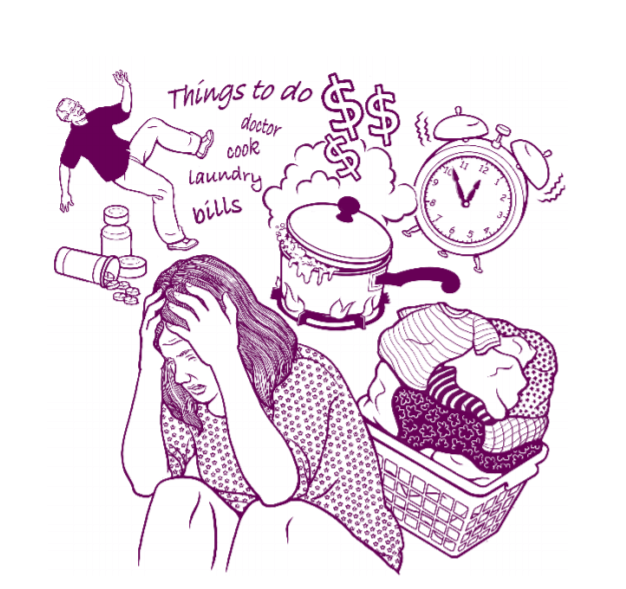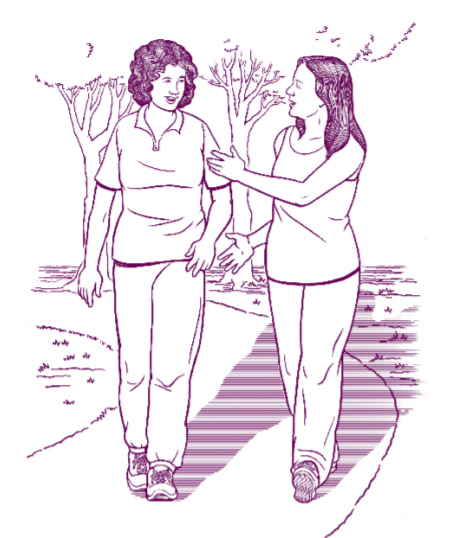Stress happens when your mind and body are overloaded with pressure and worry. This overload is not good for your health, especially if it continues for a long period of time.

Causes of job stress for homecare workers include
- Concern about the well-being of the client.
- Long hours.
- Pressure to do tasks quickly or too many tasks at once.
- Fears about losing your job.
- Poor communication between you and the client.
- Job tasks that you believe are hazardous or conditions in the client’s home that you believe are unsafe.
- Requests to do tasks that are not part of your job.
Too much stress on the job can make you
- Feel sad and depressed.
- Cry more often than usual.
- Have low energy.
- Not want to do things you used to enjoy.
- Have sleeping problems.
- Have changes in your appetite.
- Become sick more often.
- Increase use of alcohol, tobacco, or drugs. Feel angry at the client or other people. Think about hurting yourself or others.
Tips
It’s hard work caring for another person. Take care of yourself! If you don’t, you won’t be much help to anyone else. Here are some ways to deal with stress on the job:
- Make a list of what is causing your stress at work. Are there ways to reduce these problems?
- Start by selecting one or two issues to work on so you don’t feel overwhelmed.
- Talk to friends, family members, or other homecare workers.
- Call an agency or program for help. (See find help section, on page 68.)
- If appropriate, talk to the client about the problems. You might invite a person who is supportive of you and the client to be present. Come prepared with ideas for possible solutions.
- While you’re trying to work out problems on the job, follow some healthy-living suggestions:
- Exercising.
- Eating well.
- Talking to a friend or counselor.
- Getting enough sleep.
- Keeping up-to-date on vaccines, such as flu shots.
- Trying to avoid alcohol and drugs.

Find help
Problems Getting Paid by Employer
- If you work for an agency or company, call your employer. Your union can help you with this, too.
- If the problem is not resolved, contact the Wage
- and Hour Division of the Department of Labor in your state. To find the local office in your state, look online at www.dol.gov/whd. You may also look in the front of your phone book for state government pages. Find the state department of labor. The wage and hour division will be listed there. (You can also call 411.)
Harassment
- If you are being harassed or discriminated against by your client or someone else living in the home, report it to your agency or company. If you are in a union, ask your union to help you with this, too.
Elder Abuse
- If there is abuse in the home, or if someone is abusing the client, contact Adult Protective Services in your state. Look in front of your phone book in the State Government section. (You can also call 411.)
Counseling Help
- To find out about counseling services contact your medical provider, employer, or a community or religious organization.
To do list
New ways to handle stress:
_____________________________________________________________________
_____________________________________________________________________
_____________________________________________________________________
_____________________________________________________________________
People or organizations to contact for help, tools, or information:
_____________________________________________________________________
_____________________________________________________________________
_____________________________________________________________________
_____________________________________________________________________
Building on the above to do list, you can combine them with other to do lists from the other tips in this series to create your own combined action plan for safety and keep it on hand to remind you both about staying safe.
Reference: “Caring for Yourself While Caring for Others” by Center for Disease Control’s National Institute for Occupational Safety and Health (NIOSH).
* * * * *
Is caring your calling? We’re hiring qualified people committed to helping others. We serve clients in Contra Costa and Alameda Counties, mainly in Danville, Blackhawk, San Ramon, Dublin, Pleasanton, Castro Valley, Hayward, Livermore, and communities along the 680 Corridor of the East Bay. Learn more here.
You may submit an application here.